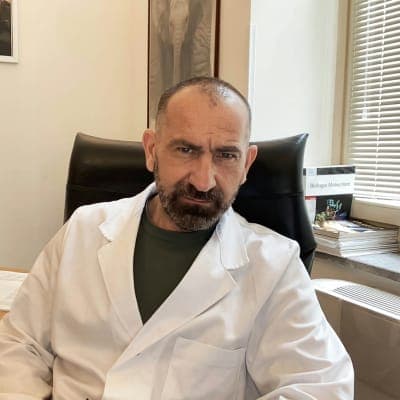
Giovanni Di Bernardo, PhD
Associate Professor of Molecular Biology
Professional Information
Biography
Prof. Giovanni Di Bernardo is a recognized expert in cellular aging and stem cell biology, with significant contributions to understanding senescence mechanisms and their role in age-related diseases. His work continues to inform new therapeutic strategies for modulating aging processes at the cellular level.
Specialization
Stem Cell Biology, Molecular Biology, Aging Research
Education
1994: M.Sc. in Biological Sciences (summa cum laude), University of Naples
2003: Ph.D. in Design and Use of Biotechnological Molecules, Second University of Naples
Prof. Di Bernardo has held postdoctoral research positions at the Italian National Research Council (CNR) and served as a visiting researcher at the Hebrew University of Jerusalem.
Research & Publications
Research Focus Prof. Di Bernardo’s work focuses on: Stem Cell Biology and Cellular Senescence Senescence-Associated Secretory Phenotype (SASP): He investigates how proteins like IGFBP-4 and IGFBP-7 contribute to secondary senescence in healthy cells, shedding light on mechanisms of aging. Obesity and Stem Cell Function: His research has revealed that high-fat diets alter the biological and molecular behavior of mesenchymal stromal cells (MSCs), contributing to metabolic dysfunction. Selected Publications and Scientific Contributions Author of over 100 peer-reviewed publications, with more than 2,000 citations Guest Editor of the “Aging and Senescence 3.0” special issue in the International Journal of Molecular Sciences (MDPI) (MDPI, PubMed, ResearchGate) Prof. Giovanni Di Bernardo is a recognized expert in cellular aging and stem cell biology, with significant contributions to understanding senescence mechanisms and their role in age-related diseases. His work continues to inform new therapeutic strategies for modulating aging processes at the cellular level.